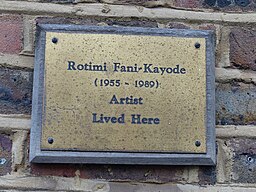ROTIMI
Image credit: Megalit, CC BY-SA 4.0 https://creativecommons.org/licenses/by-sa/4.0, via Wikimedia Commons
(Oluwarotimi) Rotimi Fani-Kayode was born in 1955 in Lagos, Nigeria. His father was a politician and chieftain of Ife, the ancestral Yoruba capital. In 1966, amid the Nigerian Civil War, 11-year-old Fani-Kayode moved with his family to Brighton, England. He went to the United States to study at Georgetown University where he gained a BA degree and, later, at the Pratt Institute, where he earned a Masters in Fine Art in 1983. Fani-Kayode then returned to England to pursue photography.
He also helped to found the organization Autograph: Association of Black Photographers.
Working during the height of the AIDS crisis and responding to the homophobia of both Thatcherite England and his home country of Nigeria, Fani-Kayode produced images that exalt queer Black desire, call attention to the politics of race and representation, and explore notions of cultural identity and difference.
He wrote, “On three counts I am an outsider: in matters of sexuality; in terms of geographical and cultural dislocation; and in the sense of not having become the sort of respectably married professional my parents might have hoped for.”
Fani-Kayode combined African and European iconography in his work as a way to contest the marginal status of Yoruba thought and explore the vexed position of the Black body in the Western imaginary. In the photograph Adebiyi (ca. 1989), the subject holds a mask featuring the stripes of Eshu, the trickster god of Yoruba mythology. Yet the mask is not traditional or “authentic” in form but a cast, transformed into an ironic, mocking signifier of African “otherness” that subverts the Primitivist tropes of European modernism. In other images, omens of death, such as hooded figures, comingle with explicit eroticism. Untitled (ca. 1989) takes on a lush, baroque sensibility, depicting two men draped in rich velvet fabric, sensuously embracing in dramatic chiaroscuro with their face averted from the viewer. By capturing such moments of intimacy and communion, Fani-Kayode presented queer sexuality as an act of healing, even as a means of personal and political survival.
Fani-Kayode had solo shows at Riverside Studios, London (1986); Harvard University’s Hutchins Center, Cambridge, Massachusetts (2009); Rivington Place, London (2011); Iziko South African National Gallery, Cape Town (2014); Tiwani Contemporary, London (2014); Syracuse University Art Galleries, New York (2016); and Hales Project Room, New York (2018). His work has been included in group exhibitions at numerous venues, including South West Arts, Bristol (1985); Oval House Theatre, London (1987); and Camerawork, London (1989). It also was featured in the African Pavilion at the Venice Biennale (2003) and at ARS 11 (2011) at Kiasma Museum of Contemporary Art, Helsinki.
Fani-Kayode joined the ancestors in December 1989 at the age of 34.
Sources: guggenheim.org




